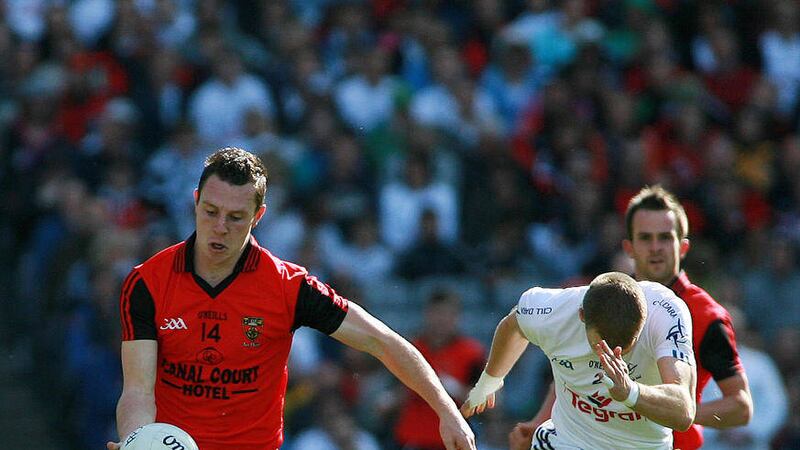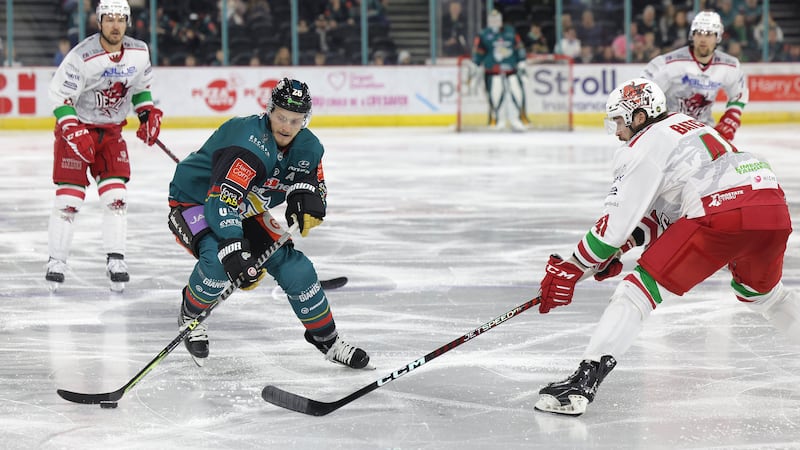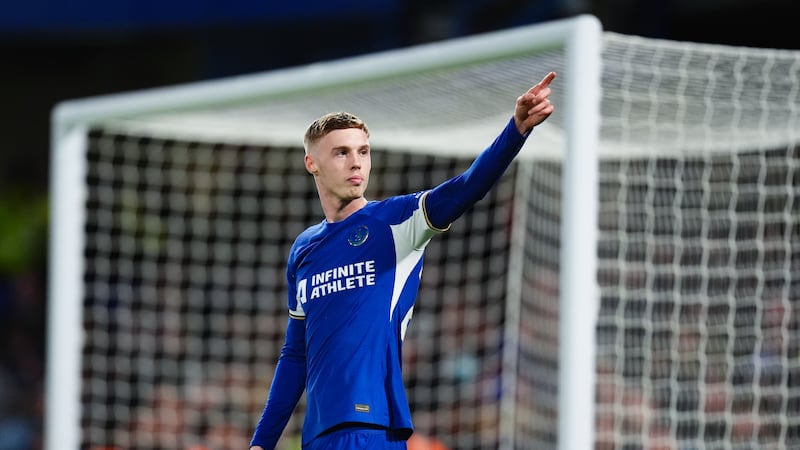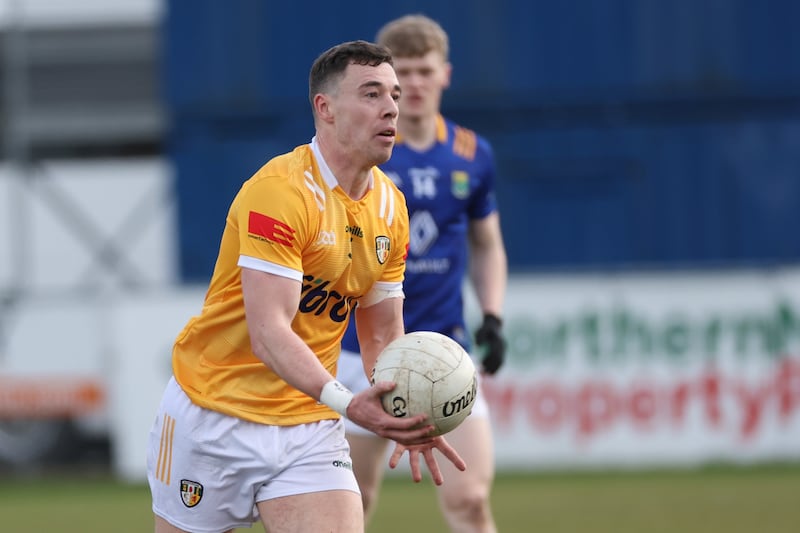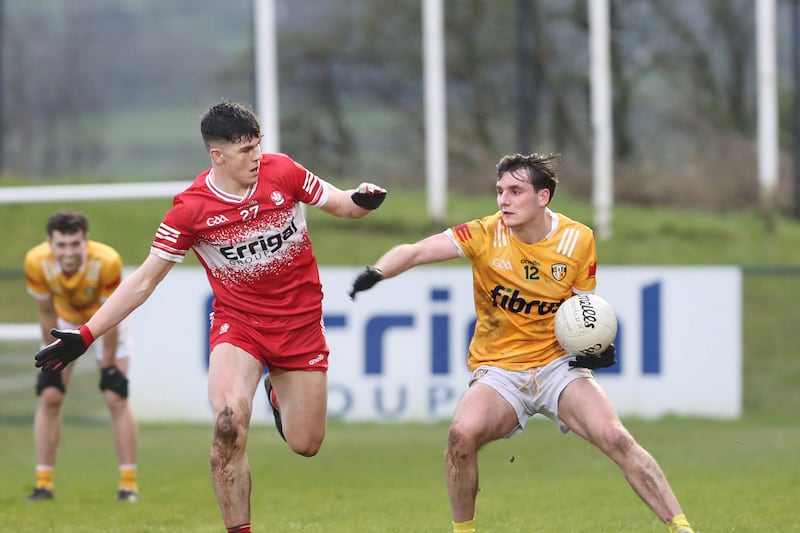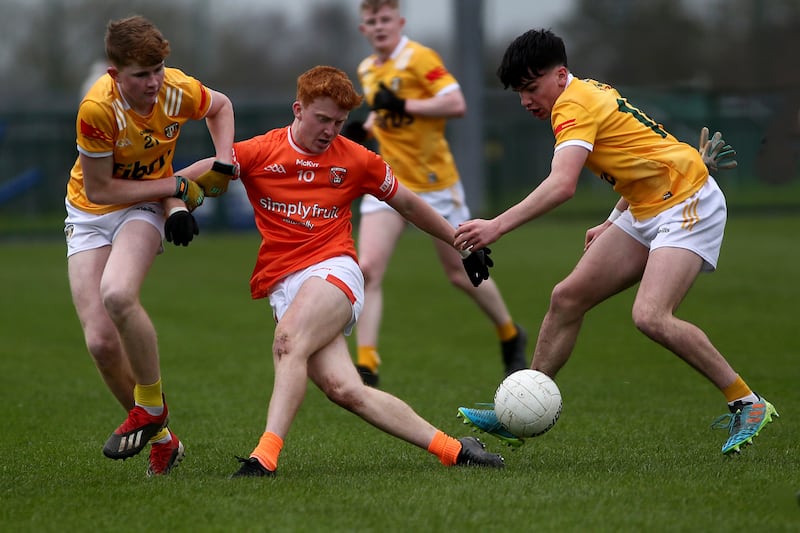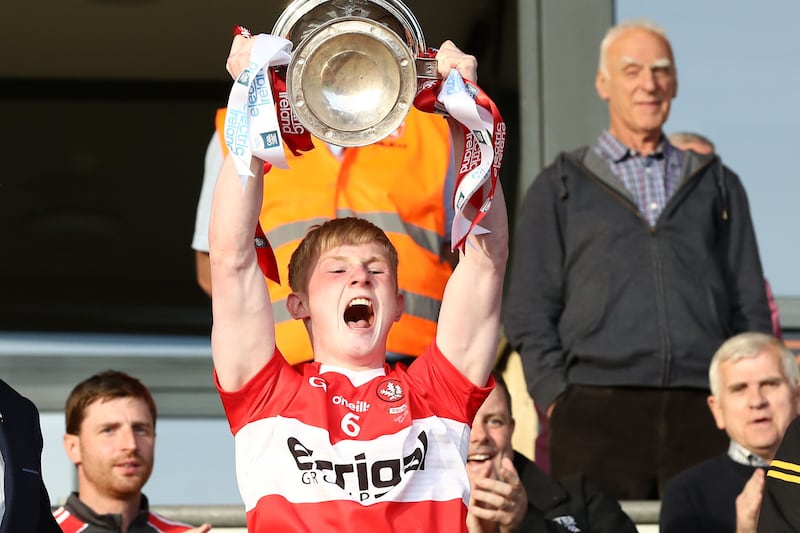FOR the third year in-a-row, Donegal and Monaghan will battle it out for the Anglo-Celt Cup. The other Ulster counties are playing second fiddle to two counties who have shared the last four Ulster titles between them.
Provincial powerhouses Tyrone and Armagh have gone off the boil. The Red Hand’s last Anglo-Celt win came in 2010, the Orchard men haven’t been in a final since 2008 when they saw off Fermanagh after a replay.
It’s even worse for the rest. You have to go back to 1998 for Derry’s last Ulster title and Down haven’t won an Ulster since 1994. Cavan’s win in 1997 was their first in 30 years and the Breffni men look a long way from repeating it. Antrim’s final appearance in 2010 looks like a flash in the pan, while Fermanagh missed that chance in 2008.
DONEGAL
Donegal's Brendan Devenney played his football in an era when Armagh and Tyrone ruled the roost in Ulster.
For all the talent in the side, the Tír Chonaill men couldn’t compete with their northern rivals and were also-rans until his former team-mate Jim McGuinness took over as manager with an if-you-can’t-beat-them-join-them blueprint for success.
Donegal were transformed under McGuinness and are chasing a fourth Anglo-Celt Cup in five years to go along with the Sam Maguire they won in 2012.
“Jim learned everything from Armagh, it was Armagh more so than Tyrone,” said Devenney.
“Tyrone had more fast, fluid players which is the reason they excelled in Croke Park more than Armagh did.
“Armagh were suited to playing in Clones and they were very tough. They had us completely figured out and McGuinness learned a lot from Armagh because they got inside our heads, whereas Tyrone had more natural footballers.
“Armagh were a wee bit rigid but when you played them in Clones they were hard. They had a lot of tactics – we had no tactics at all. Donegal became that kind of physical side that you didn’t want to play against.
“Armagh had a system and they were probably ahead of their time but they were success-starved too up until that period that the two Brians started and then Joe Kernan took them on.”
Devenney played 11 seasons for Donegal and knows the levels of commitment that is required for success at Championship level, particularly in Ulster.
“The way we play in Ulster requires such a level of commitment – it’s tough,” he said.
“If you’re a team in Ulster and you go to that workrate level and buy into what has to be done I don’t think you can sustain it forever.
“There’s always the passing of time when the main men and maybe the manager goes. “Tyrone and Armagh were dominating for so long, they had a great bunch of players but there’s nothing easy in Ulster and you’re not seeing that in Leinster or Connacht at all.
“Players can do that for so long. In Tyrone they were all around the one age – except for the likes of Peter Canavan – that team all came through at the one time.
“A lot is expected in Tyrone because it’s such a hotbed but it’s hard for the leaders to come through and they are at that kind of awkward stage.
“Armagh have dropped off considerably and maybe they have less to pick from in terms of the spread of players.
“At the minute Donegal and Monaghan have taken up the mantle. They were success-starved and now they’re riding on the pig’s back.”
But Devenney warned that the Donegal-Monaghan axis won’t last forever. When the right group of players emerges for one of their neighbours and the right man comes along to lead them, success will follow.
“It’s all down to the management really,” he said.
“If a new manager comes in and gets the county board behind him and gets a group of hungry players things can change.
“You saw with Kieran McGeeney last year – he almost took the team from nowhere to an All-Ireland semi just by getting everybody to buy in.
“This year it’s very interesting – everybody is expecting Armagh to push on but if anything they went back. McGeeney as a legend coming in lifted a lot of the young boys but there is still a lot of development to be done and they’ll need a big building programme.
“At the minute Donegal have the experience but that time has to pass and when it does it depends on the players coming in and backing it up – there will be a transition period there.”
MONAGHAN
Mick O’Dowd won Ulster titles with Monaghan in 1985 and 1988 when the county threatened to make a first breakthrough at national level.
Thirty years on, Monaghan are knocking on the door once again and Clontibret native O’Dowd says the current team could go a step further than the men of yesteryear.
While he acknowledges that success in a county with Ireland’s fourth-smallest population is “cyclical” he points out that the current era of success hasn’t come along by chance – it’s all down to work behind the scenes and at underage level.
“We kind of went down in the dumps after the 1980s. People think these teams are going to be there forever but they don’t,” said the Clontibret native who bagged a famous goal against Kerry in the 1985 All-Ireland semi-final.
“With a small population like Monaghan most things are cyclical. Monaghan dropped down to Division Four and there was huge effort put in by the county board.
“You had Niall Moyna and Declan Brennan moving up to DCU and a lot of Monaghan players went up there. Then you had club teams coming through – Clontibret won an Ulster minor in 2001.
“We got development squads and we got good men in and borrowed men from other counties to see what they were doing like Martin McElkennon and Paul Grimley.
“We tried to glean information from these men on why they were doing well and why Monaghan wasn’t doing well.”
O’Dowd has had successful club management stints in his native county as well as Cavan and Armagh and was part of the Monaghan minor set-up that produced senior players like Jack McCarron, Thomas Kerr, Ryan Wylie, Thomas Connolly and Rory Beggan.
“Getting players through from minor to 24-25 years-of-age can be a challenge,” he said.
“There are a lot of other sports out there, a lot of young lads go travelling. But if Monaghan can keep their underage teams together they should have players coming through.”
However, O’Dowd, currently manager of Armagh senior league outfit St Patrick’s, Cullyhanna, expects the Orchardmen and Tyrone to regain the ground they have lost to their Ulster rivals.
“Without doubt they’ll come back,” he said, but he believes Malachy O’Rourke’s Monaghan can deliver the All-Ireland that has eluded the county up to now.
“The reason they had the success was that they were chomping at the bit to get in. Once Down won the All-Ireland in the 1990s, then Derry got one, Donegal got one and then Armagh and Tyrone,” he said.
“Every county gets belief that for the first time they can actually do these things. Sam Maguire has come through Monaghan three times with Tyrone and twice with Donegal and we get a bit fed up with it to be honest.
“We want it to stop here with our lads rather than it going up the road.
“I don’t see why we can’t win it, if you don’t believe it there’s not much point going out onto the pitch. The thing is the panel – in Monaghan you just don’t get 10 6’4” boys who can play midfield and run all day. You just will not have the pick.
“With the current crop of players, they’d probably need to do it in the next couple of years or then they’ll be rebuilding again.”
DOWN
Down's last Ulster title came way back in 1994 and, after a two-game championship season, those halcyon days seem further away than ever.
Jim McCorry took the Mournemen back to Division One but losses to Derry and Wexford last Sunday have led to soul-searching in the county.
Since the red letter day All-Ireland final appearance in 2010, the black days have returned and John Clarke has been through both.
“I was on Down teams that suffered embarrassing Qualifier defeats in Longford (2002) and Sligo (2006),” said Clarke.
“So I know what losing to Wexford feels like and there will be people out there taking a pop at players at every opportunity this week especially.
“The players will be hurting big time this week and a fair few will be keeping the head down around the county in order to avoid any conversation or possible criticism on Saturday’s defeat.
“Although the year started off well with promotion to Division One this was a false dawn and in my opinion perhaps the worst thing that happened to this Down team, some players maybe believed their own hype and got carried away.
“In Down the Championship is where you are judged and I was shocked to hear Jim McCorry talking about a positive year and looking towards next year on the ‘Sunday Game’ after the Wexford defeat.
“A first round Ulster Championship defeat to Derry and a first round Qualifier defeat to Wexford does not mean a positive year in Down football.
Clarke feels that McCorry isn’t getting the best players in the county on the pitch.
“For Down to compete again with the best, we need our best players playing and that’s happening,” he said.
“Down clearly lacked physical presence and experience in the Division Two final against Roscommon and in the Championship games.
“Jim made a stance in November that he wanted everyone on board then no matter who they were, but Championship games are won in May and June, not November.
“Yes, the hard yards needed to be put in but surely players like Dan Gordon and Benny Coulter should have been given time and welcomed back in February - Alan Brogan in Dublin is the prime example of how every player is different.
“If Dan or Benny had been playing in Derry or Wexford Down would have won and there are other players with experience and a physical presence that could add to the current team.
“It’s not lack of effort because this Down team has trained as much as any team in Ireland this year.
”Jim is building his own team and you have to respect that, but for Down to compete again they need good footballers first and foremost and men who can compete with the big boys.”
Off the field Clarke says Down need to invest in facilities to match their Ulster rivals.
”Down don't have the financial power of the top counties and that is problem as well,” he said.
“So it’s imperative that Down invest in a centre of excellence where all county teams can train and young lads can develop from an early age - the days of using school and club pitches for county teams seem to have gone.
“Down haven’t won an Ulster title or an All-Ireland in 21 years, an Ulster minor in 16 years or an All-Ireland minor in 10 years. From a Down point of view this is grim reading.
“If the right structures, investment and people are in place over the next couple of years hopefully it won’t be long until Down are back in the top two or three teams in Ulster. Within the next six we could be around the top four in Ireland, but it’s a long road ahead.”
ANTRIM
Paddy Cunningham has believed for a long time that Antrim are a sleeping giant in Ulster.
Yet the former Saffrons skipper believes the Casement Park debacle is crippling the county’s hopes of ever challenging the elite teams in Ulster.
Cunningham was captain when Liam ‘Baker’ Bradley’s side reached the 2009 Ulster SFC final. That season turned out to be a flash in the pan and Lámh Dhearg clubman says the lack of revenue coming into the county is halting progress at all levels.
“Structures need to be put into place before anything will happen in the county,” said Cunningham.
“There’s a lot of things holding us back. Within Antrim, we have limited coaches within the schools. That’s a huge issue. Young players are being deprived of the top coaching they are getting in other counties.
“You also need a focal point within the community to attract people to the GAA and for me, Casement Park is crucial to that if the GAA is ever to get back to where it needs to be in the county.
“For getting young people involved, a new Casement Park would be brilliant. On the back of a stadium development, you’d also have a lot more money available to the County Board – which they have been lacking in recent years.
“We’d The money just isn’t there but if Casement Park was there and you had a regular revenue from the big days, you would be able to put that money back into the underage structures for the teams and coaches.
Before their 2011 All-Ireland triumph, Dublin went 16 years without an All-Ireland crown yet the development structures currently in place have seen many predict that the Liffeysiders will dominate the GAA landscape for years to come.
“Look at the Dublin model over the last number of years,” said Cunningham.
“Look what they have done to overhaul their underage structures and now they are reaping the rewards at senior level.
“I still feel Antrim is a sleeping giant but at the minute it needs backing and support. “It’s just a county in limbo because we don’t even have a county ground and we are losing kids to other sports.
“If we were to get Casement, it would be an attraction. When we got to the Ulster final in 2009, there wasn’t a buzz like it in any other county. We need a focal point and a GAA hub in the community and there’s no better way than Casement Park.
“People says that demographics and the big city can have an impact on things.
“Yes, there are a lot of distractions that you will have to deal with if you are from Belfast that you wouldn’t have to deal with if you were from a GAA stronghold in Tyrone or Donegal but in cities like Cork and Limerick, they deal with the same issues and they are still able to put great teams out on the field in hurling or football. That shouldn’t stop the GAA from thriving in Antrim.”
Looking at the GAA landscape in Ulster, Cunningham says Monaghan and Donegal are out in front because they now possess a conveyor belt of talent.
“I think it’s a combination of having good players and a really astute manager. Malachy O’Rourke has done a brilliant job in Monaghan and I guess Rory Gallagher is just carrying on the brilliant work done by Jim McGuinness.
“If you look at the last couple of years, Monaghan have unearthed three or four different players every year so the competition for places is rife.
“Ryan Wylie is one at the back who has come through after Colin Walshe. Up front, Ryan McAnespie was one of the best minors in Ulster a few years ago.
“Realistically, other than Donegal, no other county is doing that.
“It’s the same 15-20 every year for other teams. And these teams mix that youth with experience.”
The analysis of Ulster's recent underachievers will continue in Saturday's edition of The Irish News...
